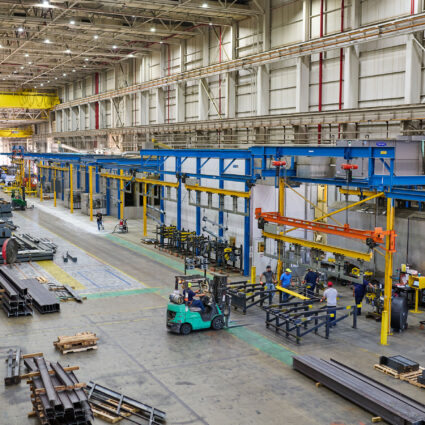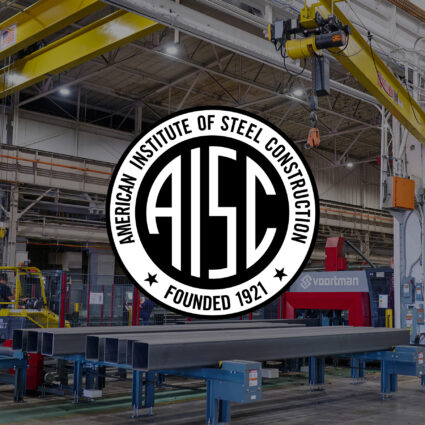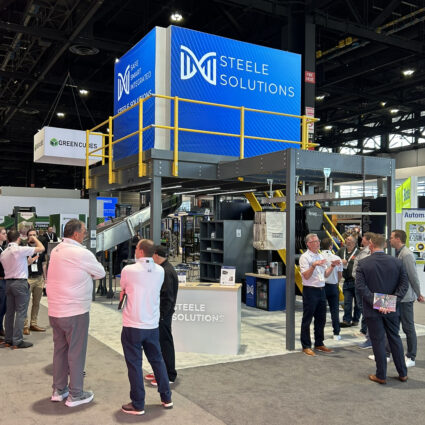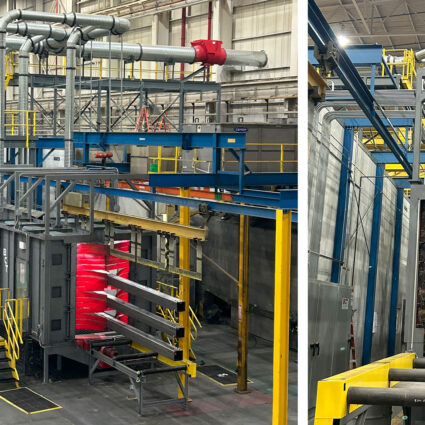What is a Mezzanine Floor? Definition, Uses & More
by Kevin O’Neill
What is a Mezzanine Floor?
An industrial mezzanine floor is not considered a building floor. Rather, it is a midway point between two floors within a floor and ceiling.
Industrial mezzanine floors can be set up on any story within a building. They can also be used for a myriad of applications.
What is a Mezzanine Floor Used for?
A mezzanine floor helps businesses increase their floor space without a building add-on. Common mezzanine platform floor applications include:
- Utilizing overhead space
- Providing additional support for equipment, piping, conveyors, materials, parts, or other products
- Elevating plant and/or factory offices
- Increasing storage and picking space
- Ensuring workers can safely access over and materials
What is a Mezzanine Floor Made of?
Businesses use mezzanine floors constructed from wood, concrete, or other materials. They also utilize steel industrial mezzanine floor systems.
The best material for a mezzanine floor depends on the application. Concrete and steel are the two most popular mezzanine flooring materials. In some instances, a mezzanine floor consists of a combination of wood, concrete, steel, stainless steel, and/or fiberglass. For heavy-duty applications, a steel or stainless steel mezzanine floor may deliver the best return on investment.
Common Types of Mezzanine Floors
1. Storage
Storage mezzanine floors are great options in warehouses. The floors make it easy for workers to safely store a wide range of items. At the same time, workers can safely access these floors as needed.
2. Work Platform
A work platform mezzanine floor is ideal for employees responsible for packaging, assembly, maintenance, and/or quality control jobs. This floor is generally set up near equipment, conveyor systems, and/or maintenance areas.
3. Portable
Portable mezzanine floors can be transported between locations. They tend to be smaller and weigh less than other types of mezzanine floors.
4. Retail
A retail mezzanine floor lets a retailer increase its floor or storage space. Oftentimes, a retailer uses a mezzanine floor to attract customers to its sales floor. As such, the floor can help a retailer promote its products and drive sales.
5. Office
Office mezzanine floors are simple and effective solutions to increase available office space. They may be used in manufacturing or other production spaces where office workers need to be close to a production floor.
Where is a Mezzanine Floor Used?
An industrial mezzanine floor can be used in a warehouse, office, or manufacturing plant. It may be used in a storage or production space as well.
What is a Mezzanine Level?
A mezzanine level refers to the floor between two levels of a building. The level helps a business increase its available floor area and maximize the space at its disposal. In addition, a mezzanine level does not require a business to make any physical additions to a building.
Mezzanine levels can be used for many reasons, including:
- Conveyor, equipment, and/or inventory rack access
- Storage
- Work operations
Distribution centers, production floors, and warehouses commonly use mezzanine levels. Regardless of why a mezzanine level is utilized, it must be set up in accordance with myriad building code standards. Also, mezzanine access stairs must meet International Building Code (IBC) requirements.
Is a Mezzanine Floor or Level Necessary?
Businesses must consider the application for a mezzanine floor or level before installing one. That way, a company can identify an option that matches its expectations. A company can also find ways to get the most value out of its mezzanine floor or level.
Explore Mezzanine Platform Options
If you have any further questions surrounding what a mezzanine level is or floor, Steele Solutions can help.
Our team can answer any questions about mezzanine platforms. We can also teach you about mezzanine floors and levels, so you can make an informed selection.
For more information about mezzanine flooring or to request a free quote, please contact us online or call us today at 1-888-542-5099.




